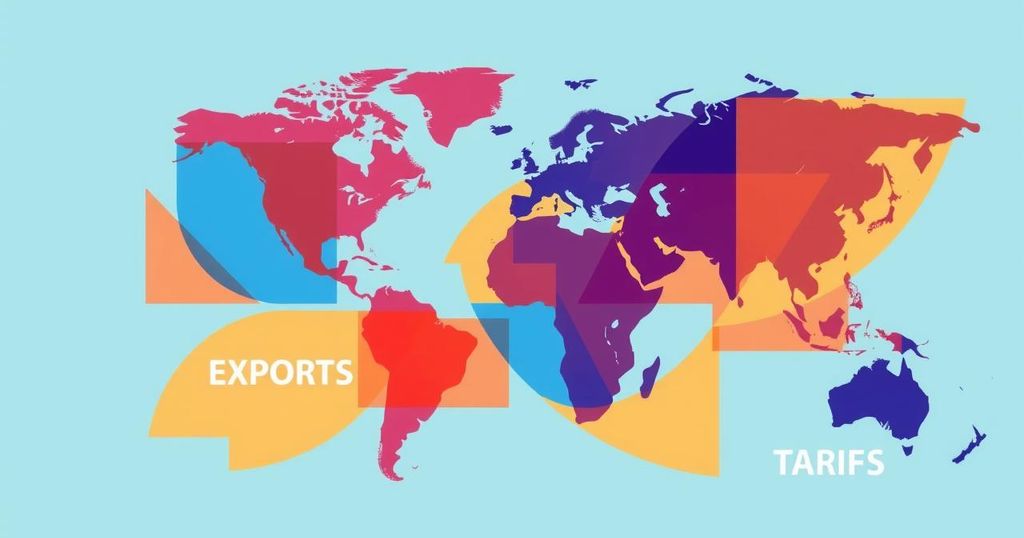Bloodbath on D-street as Hot Money Races to China: An Analysis of Market Dynamics
India’s stock market recorded a massive decline with investors losing ₹11 trillion due to substantial foreign selling amidst rising Chinese stocks, geopolitical unrest, and high valuations. On a volatile trading day coinciding with weekly expiry, the Nifty and Sensex fell over 2%, driven by record outflows from foreign investors, while rising crude prices further complicate economic prospects.
The recent festive season failed to bring the expected optimism to India’s stock market, resulting in a stunning loss of ₹11 trillion for investors. This downturn is attributed to significant foreign investor outflows amid a rebound in Chinese equities following fiscal and monetary stimulus initiatives, compounded by escalating tensions in West Asia and high share valuations in India. The sharp fall coincided with the customary weekly Nifty expiry, a period known for volatility. The market’s benchmark indices, Nifty and Sensex, recorded their most substantial declines in two months, each falling over 2%. In a single day, foreign institutional investors offloaded shares worth an unprecedented ₹15,243.27 crore, with an additional ₹10,635 crore in derivatives also sold, according to BSE data. On Thursday, Nifty plunged by 2.12% to close at 25,250.10 points, while Sensex declined by 2.1%, settling at 82,497.10. Despite domestic institutional investors purchasing ₹12,913.96 crore on the same day, it was insufficient to counteract the massive sell-off by foreign entities, with retail investor selling data remaining unavailable at this time. The surge in investor anxiety was highlighted by the fear gauge, India Vix, which jumped 9.86% to end at 13.17, marking its largest increase in two months. The most affected sectors included Nifty Realty, which fell 4.36%, and Nifty Auto, which decreased by 2.88%. Key stocks leading the decline included Reliance Industries, HDFC Bank, and Larsen & Toubro, which collectively accounted for nearly half of Nifty’s loss. Analysts noted that while many foreign portfolio and institutional investment flows are traditionally stable, short-term capital, often termed “hot money,” can easily shift destinations. Sanjeev Prasad from Kotak Institutional Equities remarked, “Part of the negative impact on flows in stocks and on an incremental basis is that of hot money getting diverted to China from India.” Such outflows are particularly pronounced as monetary moves in Beijing attract investment away from India. Furthermore, Andrew Holland from Avendus Capital highlighted that although the Federal Reserve’s recent interest rate cut usually favors emerging markets, the current circumstances have redirected flows towards China, adversely impacting nations like India. The rising crude oil prices, exacerbated by geopolitical tensions, have further pressured the Indian economy, potentially leading the Reserve Bank of India (RBI) to maintain higher interest rates than anticipated. Current geopolitical events, particularly in the Israel-Iran conflict, have also lent a hand to inflationary pressures, which could affect monetary policy decisions. Despite ongoing challenges, industry experts believe that domestic capital may gradually absorb the selling pressure from foreign exits. A. Balasubramanian from Aditya Birla Sun Life AMC stated, “Hot money outflows are likely from India to China in the short-term, but domestic money can absorb the selling over time.” Future meetings of the Monetary Policy Committee, particularly in December, will be crucial in assessing the impact of rising inflation on policy adjustments. Overall, the recent market dynamics underscore the volatility resulting from external economic influences and internal valuation concerns, leaving investors in a precarious position as they navigate these challenges.
The Indian stock market has witnessed significant volatility primarily due to heavy foreign institutional investor outflows and rising geopolitical tensions. The recent increase in Chinese stock valuations, bolstered by fiscal and monetary stimuli, has shifted investment focus from India to China, impacting local markets. Additionally, the backdrop of escalating conflicts in West Asia and rising crude oil prices has compounded these challenges, creating uncertainty for investors and prompting discussions surrounding the Reserve Bank of India’s monetary policy actions.
In summary, the Indian stock market faced a substantial setback characterized by ₹11 trillion in losses due to record foreign outflows amid shifting investor sentiment favoring Chinese equities over Indian stocks. The dynamics of hot money, coupled with geopolitical tensions and inflationary pressures from rising crude oil prices, present significant challenges ahead. As market participants anticipate the forthcoming Monetary Policy Committee meetings, the potential for policy adjustments in response to these economic factors will be closely monitored. Overall, these events highlight the intricate interplay between domestic market conditions and external economic influences moving forward.
Original Source: www.livemint.com








Post Comment